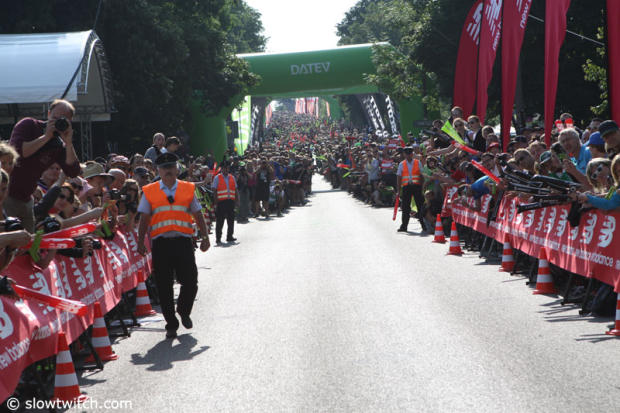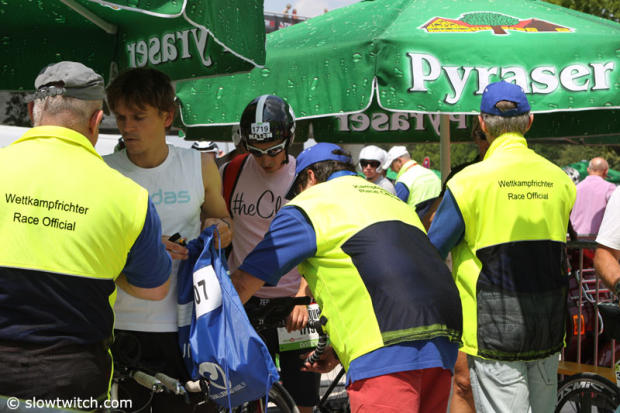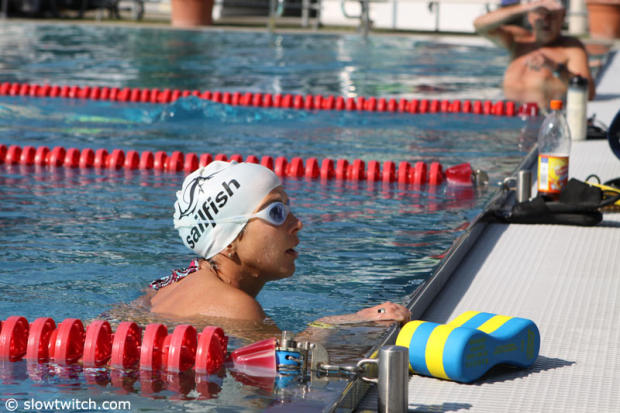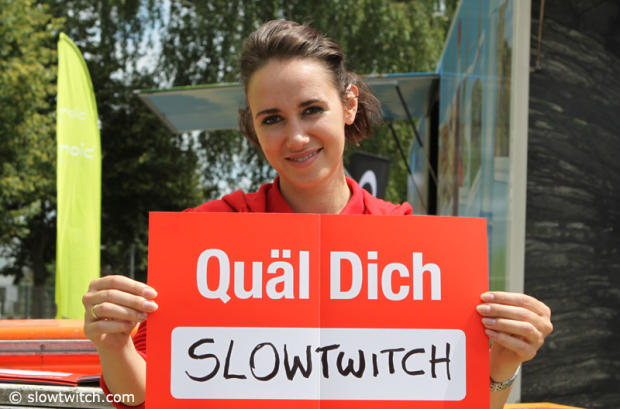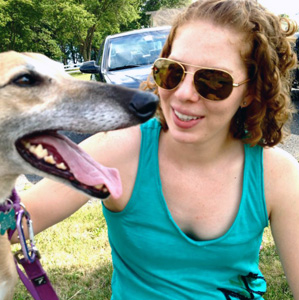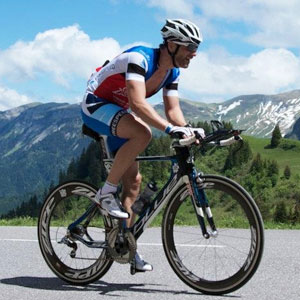Random AG Nuno Henrique Luz
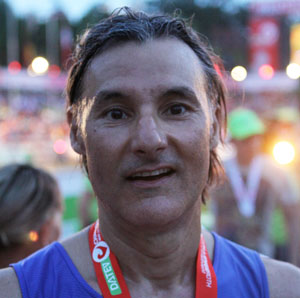
We stumbled upon Portuguese age grouper Nuno Henrique Luz at the DATEV Challenge Roth swim practice and we knew in an instant that he ought to be interviewed. He came to Roth prepared and in the company of Pro triathletes Sergio Marques and Vanessa Pereira, plus his coach and fast age grouper Hélder Milheiras. But this event was his very first triathlon.
Slowtwitch: Nuno it was good meeting you.
Nuno Henrique Luz: Great meeting you too, Herbert. I'm a longtime reader of the slowtwitch homepage and greatly enjoy your writing, as well as Dan Empfield's and the more tech/gadget-focused writers.
ST: Have you recovered from your adventures in Roth?
Nuno: I have. I felt pretty great the first week after Roth. I did two very easy, very pleasant 30-40 min runs in the woods and even thought I was ready to go back to mountain biking the weekend after. But I made a big mistake, a friend who is training for a 24-hour race convinced me to join him on what he promised would be a soft weekend and we ended up with a total of 145 kilometers of riding with lots of climbing, which was really stupid. But we were on a long out and back in the middle of nowhere and after a while I had no choice.
At that point I understood what my coach had told me: you'll feel ok until you try to make an effort, then the damage from the Ironman will sink in. Now, a few days after that, I'm starting to feel recovered, if my 12k run from yesterday is any indication.
ST: It is quite rare for someone to pick a full distance race as a first triathlon.
Nuno: I know. But I wanted to take that leap and suspected that maybe I could pull it off, as long as I was not racing for time. My coach told me that I should be able to do it in 13h to 13h30 and I finished in 13h31.
In the beginning I told myself that this was a project, an ambitious one, and I had a year to work on it and make it a reality. For me, the legs were just a tool – this was mainly a mental, an intellectual pursuit. But the fact that it was also huge added some anxiety. But in my view part of the appeal when you take on a challenge is the fact that you're never 100% sure that you'll be able to rise above it.
ST: We understand that Roth is a wonderful race but wasn’t there something a bit closer for that first time out?
Nuno: There were a few races closer, especially in Spain, but I had a thing about Challenge Roth. I know people who did it, I've always heard great feedback about the event, I knew it was the biggest triathlon in the world – and it was open to non-professionals! I also appreciated two other things I knew about the race. First, the way the local community embraces the event and the atmosphere that creates around it. It was amazing to do the Solarer Berg climb on the bike and to not see the road until the crowds parted at the last moment. And passing through villages with thousands at the table besides the road drinking those enormous German containers of beer.
Second, the time cuts were tighter than in other Ironman races – 15 hours total instead of 17. That meant that people walking a 6 hour marathon was not evident. I wanted to run the whole marathon and did not want to have the option of walking most of it. I don't know exactly why, but I felt that that option would imply a general relaxation of standards. Most of all, Challenge Roth was to be a goal to do before I turned 50 last October. But I crashed with my motorcycle last year so I was out of action for a while and the whole plan was postponed for 2013.

ST: They way I understood it – the swim was apparently your biggest concern.
Nuno: Yes, it was. I had read all the stories about the swim being the most dangerous segment of an Ironman, with a few deaths every year. Being the belt-and-suspenders type, I fretted a bit about that. A few months ago there was a good series of articles on Slowtwitch about what you can do to prevent that, or at least minimize the risk, and I learned from there too.
But the main problem was that I started learning to swim freestyle only last year, and I've never been confident in my progress. It's something that I've struggled with ever since, still do, and – I suspect – will for a long time. I hired a swim coach to try and solve that, but either he, being a good coach, was not the right coach for me, or I was a bad pupil, or most likely both.
ST: How did you actually get ready for that 3.8km swim?
Nuno: I also thought of it as a separate challenge I had to overcome. Being a terrible, almost embarrassing to watch freestyle swimmer – at least in my mind: my coach says my technique is now not that lousy, that there are much worse swimmers in triathlon, but I knew that I was a reasonably good breaststroker, could keep at it for a long time, and my pool times swimming breaststroke were more than enough to meet the time cut in Roth, even if that was tighter that in other Ironman events.
I also found out, from a test on a beach swim the week before, that I had no problem with the breaststroke kick with the wetsuit on. No waste of energy to lower the legs to avoid kicking outside the water, something I had read about. I knew that the legs would have a bit more fatigue for the bike than if I swam freestyle, but I also knew that I could manage the effort on the bike.
So I decided to do it breast stroking. I was conscious that I had to be careful not to kick anybody, that it wouldn't be the most pretty of sights, but I didn't care. And I was aware that in Roth it was not an ocean swim, possibly with waves and currents. We would be swimming in the Hipoltstein canal, which looked peaceful enough from pics and videos and coach's mouth and also on Saturday, when we swam there for a few minutes.
ST: With all these waves in Roth you did not really encounter the typical long course 2,000 folk swim start. But did it feel crowded?
Nuno: Not really, mainly because I let my wave go and started a few seconds later, and then chose the most outside line, at a good side distance from the main pack of swimmers. I even did the turns far removed from the buoys. I'm sure I swam a few extra meters, but it paid off because the whole swim went very well, I was very relaxed the whole time, didn't touch anybody and exited the water comfortably on time – 1h36. Not pretty, but necessary on the day.
ST: Once you were on the bike, did that feel that as if the monkey was off your back?
Nuno: A little, yes. When I started doing sports, five years ago, it was with a mountain bike, and I've been cycling ever since. That MTB made me quit smoking, until 2008 I had a pack-a-day, unfiltered cigarette habit, made me lose weight and generally made me enjoy being active, especially in nature – made me realize how true it is that our bodies are made for movement. I just feel at home on the bike.
I fell in love with cycling and, being a curious and analytical person, have been training with a powermeter since 2010, a Cycleops Powerbeam Pro, since my bike training is mostly at home – work, three young children, etc. Nature is for weekends, whenever possible, but mostly, now, for runs as I hate treadmills.
After I started training more seriously, with a coach, still in 2008, I did a few half- and full MTB marathons – 40 to 100 kms – and then starting thinking about bigger challenges, things that I'd read and daydreamed a little bit about. As a result, these last four years I've done seven MTB week-long stage-races: two TransPortugals, two TransAlps, one TransPyr, one Titan Desert and one Brasil Ride.

On these, I've had a few 10+ hours days, and I learned a lot about pacing, and eating, and dealing with heat, and managing mental reserves, with those epic stages. That would, I imagined when I started thinking about Ironman, prove useful during an IM bike leg – in fact, during a whole Ironman race.
In the months before Roth I also did a 300 kilometer road race in Portugal just to see how my body and head dealt with such a thing, especially in the second half, and also to mentally shorten the 180 kms of the IM bike leg.
ST: Was the ride smooth?
Nuno: It was. I took a long time in T1 (17 minutes) and my coach asked me later if I was writing a book. I just wanted to keep calm and lose that heavy feeling on the legs after the breaststroke swim. I was not wearing a tri-suit and went with regular cycling kit, so had to put that on too. And socks!
Once I started riding, it all went smoothly, maybe a bit too much. My plan was the exact opposite of the traditional goal of negative-splitting the bike. Roth is two 90 kms laps, so my idea was to go with a comfortable effort on the first lap, to see how much it took me and if I would easily make the time cut and I confirmed that I would. I then used that large buffer to go a bit slower on the second lap, because, even if I was not really racing, as I said I wanted to be able to run the full marathon. And I had never run a marathon – I had run two halfs and a couple of 30k trail runs with lots of climbing in the months before Roth. I also knew that the wind would pick up somewhat in the second lap.
In hindsight, I think I was too conservative on the bike. But that's something I only realized during the marathon, especially during the second half – I was feeling good enough to go a little faster on the last 6 kms. The main thing I need to work on is riding in the aero position. In Roth I went with my Seven titanium road bike and I stayed on the hoods, too upright, I'd say 99% of the bike. Next step is fitting a decent set of aerobars, change the saddle and do a new bike fit. That's for the next couple of months. After that, I plan on buying a more appropriate bike.
But I have a personal policy of not buying what I call gear above the legs. Meaning, gear better than the legs of the guy who'll be using it. So, first, improve legs – by which I mean all things physical and technical, like the aero position – and then reward yourself with the gear you now deserve.
ST: What did you think about the spectators?
Nuno: Amazing atmosphere. 220 000 spectators is just incredible. I've never seen anything like it, and being in the middle of it all even more so. They made Roth one of the greatest – non-family related – days of my life. And the staff and the volunteers – some 3000 people, if I remember correctly – were so professional, on the one hand, and so enthusiastic and plain happy to be involved, on the other, that it was contagious.
You can see all around, from the general efficiency of the whole organization to the people who give a face to the event, that the team who runs the race – the Walchshöfer family, Alice, Felix and Kathrin – is doing something right.
ST: I saw you at the finish and you looked absolutely relaxed and happy. Is that a fair statement?
Nuno: Yes! I had that feeling of mission completed. The mission being to meet the challenge, to fully enjoy the day while doing so and – what I value most now that I've done my first Ironman – to learn. I also said in my head, Nuno, you are an Ironman. We spoke for something like 15-20 minutes right after I crossed the finish line and then I was really needing my German coke.

ST: Does that mean you will return to adventure racing and marathon mountain biking?
Nuno: MTB is my go-to past time with friends. MTB stage racing, not this year and probably not in 2014. In August I'll be doing a stage-race, but with the road bike – the Haute Route Alps. Then, in October, I would like to do another Iron distance race – but closer, and with an ocean swim. Maybe in Spain.
Next year, I would love to do an Ironman with more climbing. My coach says that I should be more suited for an IM with more elevation gain, since what I most enjoy about biking is going up and it's also what I'm better at.
Last year, I did the TransPyr and TransAlp MTB stage-races back-to-back, with a total of 44 000 meters climbing and 1400 kms in 16 stages, and I think I handled myself reasonably well. By the way, I did it with an American partner – Jason Sumner. He is a journalist who contributed greatly to the experience.
ST: What do you do when you are not training or racing?
Nuno: I'm a journalist. I started as a film and book critic but have done almost everything in journalism. Until recently I was the editor-in-chief of Metro, a free daily and then the third-biggest newspaper in Portugal. I am now setting up a new project with two business partners. Outside work I enjoy spending time with my children and am always on top of cultural affairs. I also love to eat out and travel with my motorcycle. So kids, books, films, music, food, socializing and motorcycle travel. Besides work and sport, that's basically my life.
I avoid television like the plague except for sports events like the Tour or the Giro or tennis Grand Slam Tournaments and some choice soccer games of Benfica, my club – and the club with the largest paying number of supporters in the world, according to the Guinness book of records; yes, I am a bit of an ultra -, although they have been disappointing me recently.
ST: Is there anything else we should know?
Nuno: I was racing for a charity called Charity Multisport. We raise money to help poor kids in Mozambique, a former Portuguese colony. The founding partners are all endurance athletes, a few of them Portuguese champions.
I who would like to thank two people who greatly helped me on the way to Roth – my coach Hélder Milheiras, a friend and a brilliant guy who has raced Hawaii and knows a lot about triathlon and about people, an invaluable skill in my book. He was with me in Roth and he helped me navigate the logistics, gave me great information, and trusted me when – as I've done for a year. I told him that I had my own nutrition ideas, I had tested them with success, and I would go with that plan.
Then, a bike shop near Lisbon called Rbikes – especially its owner, Rui Miguel Pancadares, also a dear friend and sort of a sponsor of mine. He was also my training partner for quite a few runs this year and I learned a lot from him too. He's a very accomplished mountain biker who also did his first triathlon – a half-IM in the north of Portugal – on the same day as I did Roth.
Without these two guys, I wouldn't have been in Germany on the 14th of July.


